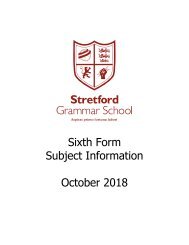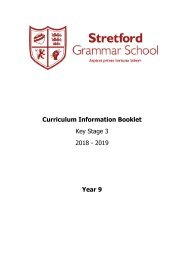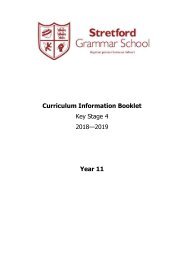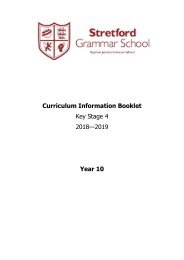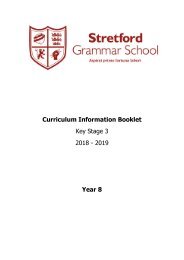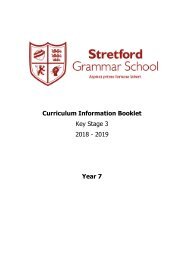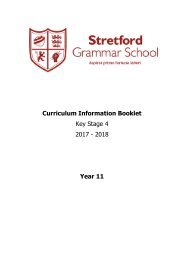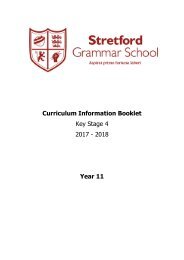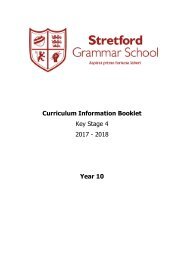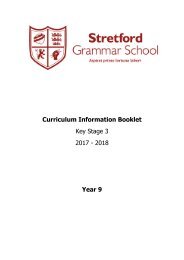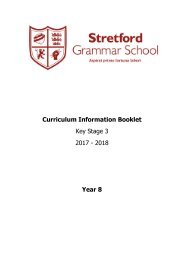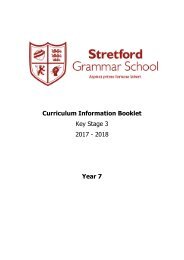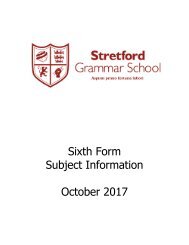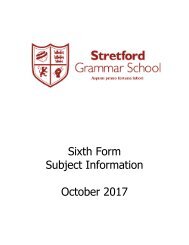Options Booklet 2017
Create successful ePaper yourself
Turn your PDF publications into a flip-book with our unique Google optimized e-Paper software.
Key Stage 4<br />
<strong>Options</strong> <strong>Booklet</strong><br />
Making the Right<br />
Choice - 2018
Introduction<br />
We are very aware of the efforts that all parents and carers make in ensuring that<br />
their children realise their potential in all aspects of school life. The aim of this<br />
booklet is to help you support your child’s learning and to provide an outline of the<br />
curriculum in each subject area.<br />
In addition, the following information is relevant to all subject areas:<br />
<br />
<br />
<br />
<br />
<br />
Homework – a homework timetable is published at the beginning of each<br />
academic year. This is recorded on Satchel.<br />
Assessments – assessments in all subjects are planned and results of key<br />
data capture points are sent home. A Parents’ Evening is planned during the<br />
academic year and a full academic report will also be sent home.<br />
Marking – in all subjects this will be carried out in accordance with<br />
department feedback policies.<br />
Parents’ Evening - this will occur during Year 10, however, if you wish to<br />
discuss the progress of your child during the year, please contact the relevant<br />
subject teacher.<br />
Data Capture – throughout Key Stage 4 parents/carers are provided with<br />
information concerning current working grade and attitude to learning. A<br />
target for improvement will also be included with this information.<br />
Any queries about subjects should be directed to the Curriculum Leader of the<br />
appropriate subject.<br />
How to help your child<br />
<br />
<br />
<br />
<br />
<br />
<br />
<br />
Show a keen interest in and appreciation of the work being done.<br />
Use the information in this booklet to discuss the work being undertaken.<br />
Encourage your child to take greater responsibility for his/her own learning:<br />
to complete homework punctually and prepare thoroughly for the<br />
examinations and assessments.<br />
Try to provide the materials/resources at home which will support learning.<br />
Monitor homework/assessment grades to ensure that good progress is being<br />
made.<br />
Contact the school if you feel progress is unsatisfactory or if you need further<br />
advice to enhance your child’s progress.<br />
Avoid making appointments at times that could affect your child’s progress.<br />
2 | P a g e
The Stretford Grammar School Curriculum<br />
All students at Stretford Grammar School follow a broad and balanced curriculum.<br />
The curriculum is designed to engage and challenge all students to strive and to<br />
achieve their full potential, both in their studies and in developing as young people,<br />
equipped to live happy and fulfilling lives.<br />
In Key Stage 4 (Years 10 and 11) students follow a core curriculum of English,<br />
Mathematics, Science, Religious Studies and Physical Education. Students have a<br />
choice of optional subjects to specialise in. We strongly encourage students to<br />
consider the choices they make at this stage within the context of the ‘pathways’<br />
open to them post-16 and beyond.<br />
Students’ social, moral, spiritual and cultural education is essential to their<br />
development as young people. All curriculum areas contribute to this, alongside<br />
provision in Form Time and within the Personal, Social, Health and Citizenship<br />
programme which includes key areas such as sex and relationships (subject to the<br />
parental right of withdrawal), careers, health, democracy, the rule of law, individual<br />
liberty and mutual respect and tolerance of those with different faiths and beliefs.<br />
At Stretford Grammar School we have a wide variety of opportunities beyond the<br />
taught curriculum. These include clubs and teams across subject areas and we<br />
strongly encourage students to participate in such activities inside and outside<br />
school, in order to achieve an effective work-life balance.<br />
3 | P a g e
Making the Right Choice<br />
Choosing the right options means that students are starting on the right path<br />
towards the right careers and that they will have:<br />
<br />
<br />
<br />
A sense of achievement<br />
A stepping stone to future success in the world of employment<br />
A chance to choose the path which meets their needs, hopes and<br />
aspirations<br />
It is usually best for students to choose the subjects they enjoy and feel confident in<br />
because they will have a greater chance of success.<br />
There are two approaches to choosing options which should be considered and<br />
reflect different pathways<br />
Pathway One – Contrasting Subjects Pathway Two – Complementary<br />
Subjects<br />
This will give a breadth of experience<br />
and will allow students to keep their<br />
career choices open e.g.<br />
These subjects work well together and<br />
may lead to a particular career choice<br />
e.g.<br />
<br />
<br />
<br />
<br />
French<br />
Music<br />
Geography<br />
Triple Science<br />
<br />
<br />
<br />
<br />
Spanish<br />
History<br />
Business<br />
Computer Science<br />
Please note:<br />
<br />
<br />
Depending on numbers, some subjects may not be viable<br />
If there is a large demand for some subjects, we may be able to run<br />
additional groups<br />
Whilst we try to accommodate as many choices as possible, there are limits to<br />
school resources. If sets are too small to be viable, the option subject may be<br />
cancelled and students will be required to study their reserve choice. In some<br />
subjects, like Drama, we are only able to run single groups because of staffing and<br />
accommodation restraints. Where these subjects are over-subscribed, students will<br />
be selected by appropriate criteria identified by the Curriculum Leader. Therefore,<br />
some students, in this scenario will also be required to make a different choice.<br />
4 | P a g e
Key Dates for the <strong>Options</strong> Process<br />
8 th February 2018 <strong>Options</strong> Evening<br />
21 st February 2018 Parental Consultation Evening<br />
23 rd February 2018 All <strong>Options</strong> Forms to be returned<br />
Reforming the Accountability System for Schools<br />
Until now schools have been judged by the proportion of students attaining 5 GCSEs<br />
at Grade C or better, including English and Mathematics.<br />
There are now four key measures:<br />
<br />
<br />
<br />
<br />
Progress 8 – progress across a suite of 8 subjects, as measured from the<br />
end of Key Stage 2 (Year 6) to the end of Key Stage 4 (Year 11). These 8<br />
subjects include English, Mathematics, 3 EBacc subjects (Sciences,<br />
Computing, Geography, History, French and Spanish) and 3 further subjects<br />
(which can include art, Business, Drama, Electronics, Religious Studies and<br />
Technology). English and Mathematics are double weighted to reflect the<br />
importance of these subjects.<br />
Attainment 8 – average attainment across 8 subjects (as above).<br />
The percentage of students achieving a Grade 5 or above in both English and<br />
Mathematics.<br />
The proportion of students gaining the EBacc.<br />
5 | P a g e
Grading of GCSE<br />
From 2018 all GCSE subjects will be graded 1-9 with a 9 being the highest possible<br />
grade in GCSE.<br />
The English Baccalaureate<br />
Whilst the English Baccalaureate is the name given to a group of subjects which<br />
achieve a 5 – 9 grade in English, Mathematics, two science subjects, Geography or<br />
History and a Modern Foreign Language, it is not a stand-alone qualification. The<br />
aim of the English Baccalaureate is to encourage the provision of a balanced core of<br />
subjects. We seek to provide students with a broad curriculum which does not<br />
preclude them from studying this suite of subjects.<br />
6 | P a g e
Assessment and Reporting<br />
The purpose of assessment is to enable an informed judgement to be made about a<br />
student’s knowledge, understanding, skills and attitude. During your child’s academic<br />
career at Stretford Grammar School assessment is a continuous process which is<br />
integral to the teaching and learning cycle. For every subject your child will be<br />
assessed at various points throughout the year and these assessments will be used<br />
to inform you about the progress that your child is making in that subject area.<br />
During each term you will receive a data capture report that contains a working at<br />
grade (WAG), a target to improve sentence and an attitude to learning grade. The<br />
WAG indicates the current level of attainment at the point in time of the report. This<br />
grade is based on the formative assessments that take place during the year.<br />
The WAG reflects the new grading system that has been introduced at GCSE. The 1-<br />
9 grading system is used through Key Stage 3 and Key Stage 4. Each grade reflects<br />
a set of skills and knowledge that are specified for each subject area. Below is the<br />
expected flight path of academic progression that your child will be tracked against.<br />
Year<br />
Group<br />
Progression Flight Path<br />
11<br />
10<br />
9<br />
8<br />
7<br />
Grade 1 2 3 4 5 6 7 8 9<br />
The Working At Grade will reflect whether a student is making progress at a level<br />
that is at the top of a grade skill descriptors (+), making the expected progress<br />
within the grade skill descriptors (=), or making progress that is at the beginning of<br />
the grade skill descriptors (-).<br />
The target to improve sentences will provide your child with specific advice on how<br />
to make further progress. The attitude to learning grade reflects your child’s<br />
approach to their studies.<br />
7 | P a g e
Assessment should be based on clear, consistent criteria which are known<br />
and understood by both teachers, students and parents/carers, and are<br />
guided by national criteria and statutory requirements where appropriate.<br />
In order to achieve consistency, assessment practice should be subject to<br />
effective moderation and standardising procedures, including regular work<br />
scrutinies, learning walks and departmental Quality Assurance.<br />
A wide range of assessment techniques should be used in different contexts<br />
and for different purposes.<br />
Assessment should provide opportunities for effective differentiation to take<br />
place.<br />
Assessment should be supported by a wide range of evidence collected over a<br />
period of time which provides a fair and thorough representation of students'<br />
skills, knowledge and understanding.<br />
Students should be involved in the assessment process so that they are<br />
encouraged to take responsibility for their own learning.<br />
The assessment process should recognise achievement, not just attainment,<br />
and seek to increase students' confidence and motivation.<br />
Assessment should support individuals in identifying strengths and<br />
weaknesses, enabling future learning to be planned through targets to<br />
improve, and assisting them in decision-making.<br />
Assessment practice should be monitored regularly and systematically and<br />
assessment procedures modified if necessary as a result.<br />
The results of assessment should be systematically recorded and used to<br />
report to parents/carers on their children's attainment.<br />
8 | P a g e
The Choices Available to Students<br />
The Core Humanity Three of the following<br />
English<br />
Mathematics<br />
Sciences (2 GCSEs)<br />
Religious Studies<br />
Core PE<br />
Citizenship<br />
Geography<br />
History<br />
Art<br />
Business<br />
Computing<br />
Design Technology<br />
Drama<br />
Food Preparation and<br />
Nutrition<br />
French<br />
Geography<br />
History<br />
Music<br />
Physical Education<br />
Spanish<br />
Triple Science (counts as<br />
one choice)<br />
9 | P a g e
The Support Provided by School<br />
An element of the Year 9 PSHCE and Work Related Learning Programme enables<br />
students to become familiar with a range of relevant resources to support them in<br />
choosing options. These include:<br />
<br />
<br />
<br />
Kudos and LaunchPad Careers Packages<br />
A Connexions Advisor in school for two days a week<br />
The ‘Which Way Now?’ programme<br />
Throughout various activities in PSHCE and Careers, students have also been made<br />
aware of:<br />
The skills, abilities and qualifications required by different occupations<br />
The courses, training and opportunities available after GCSEs and post 18<br />
The role of the Careers Advisor in school<br />
The importance of their own personal qualities, abilities, strengths, interests<br />
and hobbies in relation to subject choice and future careers<br />
Decision making skills and techniques<br />
This Key Stage 4 guide, which includes information regarding all the courses offered<br />
at GCSE, is given to all students. Direction is given about how to use the booklet<br />
and how to complete the <strong>Options</strong> Choice Form.<br />
Students have the opportunity to find out about new subjects during the <strong>Options</strong><br />
Information Evening. Students are encouraged to discuss option choices with Form<br />
Tutors, subject teachers and with the Connexions Advisor.<br />
10 | P a g e
What Support Parents and Carers Can Give<br />
Read the information in this booklet. Discuss it fully with your son or daughter.<br />
Encourage. All students at Stretford Grammar School are capable of achieving<br />
good GCSE results. Encourage your son/daughter to adopt a mature attitude<br />
towards their studies and to maintain consistent effort throughout the two years.<br />
Help your child to think honestly about themselves. You observe your<br />
son/daughter out of school using their talents at home and in the community. You<br />
know their aptitudes and see them taking initiative, being creative, pursuing hobbies<br />
and behaving responsibly.<br />
All these help to develop a curriculum vitae and may be the qualities that lead to a<br />
successful career.<br />
Seek help from staff. If in doubt please ask staff at school.<br />
What Students Can Do<br />
<br />
<br />
<br />
<br />
<br />
Before choosing any optional GCSE subjects, make sure that you have<br />
consulted with the staff in those subjects.<br />
If you are uncertain what to do, speak to your Form Tutor, Progress Leader<br />
or Connexions Advisor.<br />
Make full use of the on line careers tools in school. Consult Mr. Nicholson,<br />
the Assistant Headteacher and Work Related Learning Co-ordinator, if you<br />
need help concerning subjects which may be needed for future careers.<br />
Help yourself by matching your strengths and interests to the subjects at<br />
GCSE.<br />
Discuss choices with parents/carers.<br />
11 | P a g e
Students – your questions answered<br />
Why have I been given this booklet?<br />
This booklet is to help you plan the next two years at Stretford Grammar School.<br />
The information in here covers all the subjects at Key Stage 4 and gives advice to<br />
parents/carers on how to help and support you with making your mind up about<br />
what you want to study.<br />
Can I choose whichever subjects I want?<br />
Not exactly – you must study Maths, English, Science, RE, and Core PE. You must<br />
also choose one of either Geography or History. Remember that to qualify for the<br />
EBacc you will need to study a foreign language. After that you are asked to choose<br />
three subjects you want to study and a fourth, just in case. However, we may also<br />
come back to you if we think that the choices do not best match your talents.<br />
Will I get my first choices?<br />
It is hoped that most students will be able to have their first choices of options,<br />
however, sometimes it is impossible to give everyone their top choices. You should<br />
therefore make sure that all your choices are subjects that you definitely want to<br />
study. You should make your choices by 23 rd February, so use the time to speak<br />
to as many people as you can about what you want to study.<br />
What do I have to do to succeed?<br />
The next two years are very important to your education, you must aim to learn as<br />
much as you can to form the basis of your future qualifications. Careful planning<br />
and serious revision are the key to examination success. Stretford Grammar School<br />
has an excellent record of success because all students take their education<br />
seriously.<br />
12 | P a g e
Possible Option Routes<br />
The EBacc Route<br />
Choose a Humanity Choose a Language Choose Two of the<br />
Following (and a<br />
reserve)<br />
Geography<br />
History<br />
French<br />
Spanish<br />
Art<br />
Business<br />
Computing<br />
Design Technology<br />
Drama<br />
Food Preparation and<br />
Nutrition<br />
Geography<br />
History<br />
Music<br />
Physical Education<br />
Triple Science (counts as<br />
one choice)<br />
The Arts Route<br />
Choose a Humanity Choose from the<br />
following Arts Subjects<br />
Geography<br />
History<br />
Art<br />
Drama<br />
Music<br />
Choose the remainder<br />
from the following (and<br />
a reserve from either<br />
Column 2 or 3)<br />
Business<br />
Computing<br />
Design Technology<br />
Food Preparation and<br />
Nutrition<br />
French<br />
Geography<br />
History<br />
Physical Education<br />
Spanish<br />
Triple Science (counts as<br />
one choice)<br />
13 | P a g e
The STEM (Science Technology and Maths) Route<br />
Choose a Humanity Choose from the<br />
following STEM<br />
Subjects<br />
Geography<br />
History<br />
Computing<br />
Design Technology<br />
Food Preparation and<br />
Nutrition<br />
Triple Science (counts as<br />
one choice)<br />
Choose the remainder<br />
from the following (and<br />
a reserve from either<br />
Column 2 or 3)<br />
Art<br />
Business<br />
Drama<br />
French<br />
Geography<br />
History<br />
Music<br />
Physical Education<br />
Spanish<br />
14 | P a g e
15 | P a g e<br />
Core Subjects
English Language<br />
Examination Board: AQA<br />
Examination Code: 8700<br />
Outline of the Course<br />
What will you learn?<br />
You will learn about:<br />
Critical reading and comprehension<br />
Writing in a variety of styles<br />
Spoken Language<br />
Creative reading and writing: reading literary<br />
fiction and considering how established writers use<br />
narrative and descriptive techniques effectively;<br />
writing your own creative texts, responding to<br />
stimulus material.<br />
Writers’ viewpoints and perspectives: reading<br />
linked sources and evaluating perspectives or<br />
viewpoints; writing texts which express your own<br />
perspective on a theme.<br />
Spoken language: non-examined assessment of<br />
speaking tasks including giving a formal presentation,<br />
responding to questions and using standard English.<br />
How will I be assessed? There are two terminal exams (3½ hours in total) :<br />
Paper 1 (Creative reading and writing): 1¾ hours<br />
Paper 2 (Writers’ viewpoints and perspectives): 1¾<br />
hours<br />
Spoken language is continually assessed and will<br />
receive a separate award.<br />
Mark Breakdown Paper 1: 80 marks (50%)<br />
Paper 2: 80 marks (50%)<br />
Website links<br />
www.aqa.org.uk/subjects/english/gcse<br />
Key Dates Exams: May/June Year 11<br />
Further Information<br />
What can I do after I<br />
have completed the<br />
course?<br />
16 | P a g e<br />
Ms L. Yeomans – Curriculum Leader for English<br />
english@stretfordgrammar.com<br />
English Language is compulsory at GCSE. A good<br />
pass grade (grade 5) is a compulsory entry<br />
requirement of most post-16 colleges, further<br />
education and higher education establishments, as<br />
well as for most post-16 study and employment<br />
/apprenticeships.
English Literature<br />
Examination Board: AQA<br />
Examination Code: 8702<br />
Outline of the Course<br />
You will study:<br />
A Shakespeare play<br />
A 19 th century novel<br />
A modern drama or prose text<br />
A cluster of poetry from 1789 - present day<br />
Unseen poetry<br />
What will you learn? Literal and inferential comprehension:<br />
understanding words, phrases, sentences in context;<br />
exploring plot and character; understanding implied<br />
meaning; explaining structure<br />
Critical meaning: identifying theme and supporting<br />
points of view; understanding the significance of<br />
historical context<br />
Evaluation of style: analysing how language,<br />
structure and form contribute to quality and impact<br />
Comparison: comparing and contrasting texts<br />
How will I be assessed?<br />
There are two terminal exams (4 hours total):<br />
Paper 1 (Shakespeare and the 19 th century novel):<br />
1¾ hours<br />
Paper 2 (Modern texts and poetry): 2¼ hours<br />
Mark Breakdown Paper 1: 64 marks (40%)<br />
Paper 2: 96 marks (60%)<br />
Website links<br />
www.aqa.org.uk/subjects/english/gcse<br />
Key Dates Exams: May Year 11<br />
Further Information<br />
What can I do after I<br />
have completed the<br />
course?<br />
Ms L. Yeomans – Curriculum Leader for English<br />
english@stretfordgrammar.com<br />
English Literature is compulsory at GCSE. It is<br />
accepted for entry to Sixth Form, further and higher<br />
education. It provides you with critical thinking,<br />
analytical and writing skills which are valuable in a<br />
number of post-16 subject study areas and in the<br />
world of work and beyond. Students who are<br />
successful in English Literature go on to study the full<br />
range of university subjects from Medicine to<br />
Philosophy.<br />
17 | P a g e
Mathematics<br />
Examination Board: AQA<br />
Examination Code: 8300<br />
Outline of the Course<br />
What will you learn?<br />
You will learn about:<br />
1. Number<br />
2. Algebra<br />
3. Ratio, proportion and rates of change<br />
4. Geometry and measures<br />
5. Probability<br />
6. Statistics<br />
Number: Properties of numbers and calculations.<br />
Algebra: Manipulation; formulae; equations and<br />
inequalities; graphs; sequences.<br />
Ratio, proportion and rates of change: Using<br />
ratios; scale factors; ratio problems; direct and inverse<br />
proportion; gradients.<br />
Geometry and measures: Properties of shapes and<br />
angles; length, area and volume; Pythagoras’ theorem;<br />
trigonometry; vectors.<br />
Probability and Statistics: Calculating probabilities;<br />
collecting, processing and analysing data.<br />
How will I be assessed?<br />
Mark Breakdown<br />
Three 1½ hour examination papers, taken at the end<br />
of the course. There is no coursework or controlled<br />
assessment.<br />
On each paper, there will be a mix of question styles,<br />
from short, single-mark questions to multi-step<br />
problems. The mathematical demand increases as you<br />
progress through the paper. One paper is a noncalculator<br />
paper.<br />
You will be prepared for the Higher Tier examinations.<br />
Each paper is worth 33⅓% of the final mark and can<br />
assess any part of the course.<br />
Over the three papers, the content breaks down as<br />
follows: Number 15%; Algebra 30%; Ratio, proportion<br />
and rates of change 20%; Geometry band measures<br />
18 | P a g e
20%; Probability and Statistics 15%.<br />
The Higher Tier covers grades 4 to 9.<br />
Website links<br />
www.aqa.org.uk<br />
Key Dates Exams: May/June of Year 11<br />
Further Information<br />
What can I do after I<br />
have completed the<br />
course?<br />
Mr. C. McAvoy - Curriculum Leader<br />
Mrs. C. Mycock - Second in Department<br />
Mr. O. Chadbond - Subject Teacher and Exams Officer<br />
Mrs. K. Carter – Subject Teacher<br />
Miss. M. Patra – Subject Teacher<br />
Ms G. Leaff - Subject Teacher<br />
maths@stretfordgrammar.com<br />
GCSE Mathematics is an essential qualification for<br />
application to university and for most careers.<br />
By gaining the qualification, you not only show yourself<br />
to be numerate, but that you are able to approach any<br />
problem in a logical and analytical way.<br />
19 | P a g e
Religious Studies<br />
Examination Board:<br />
Examination Code:<br />
Outline of the Course<br />
What will you learn?<br />
Eduqas<br />
C120P3<br />
You will learn about<br />
Religious, Philosophical and Ethical Studies in the<br />
Modern World<br />
Study of Christianity<br />
Study of Islam<br />
Religious, Philosophical and Ethical Studies in the<br />
Modern World<br />
- Issues of Relationships<br />
- Issues of Life and Death<br />
- Issues of Good and Evil<br />
- Issues of Human Rights<br />
Study of Christianity and Islam<br />
- Beliefs<br />
- Teachings<br />
- Practices<br />
How will I be assessed?<br />
Mark Breakdown<br />
Website links<br />
You will study each component over the course of three<br />
years (9-11). Lessons will include a mixture of<br />
discussion, written work and group work. Your learning<br />
will be relevant and will relate to the events of the world<br />
today. You will be assessed by examination only.<br />
Component 1: Religious, Philosophical and Ethical<br />
Studies in the Modern World (2 hours – 50%)<br />
Component 2: Study of Christianity (1 hour – 25%)<br />
Component 3: Study of Islam (1 hour – 25%)<br />
http://www.eduqas.co.uk/qualifications/religiousstudies/gcse/<br />
Key Dates Exam: May/June Year 11<br />
Further Information<br />
Mrs. R. Lea - Curriculum Leader for RE<br />
Mr. I. Nicholson – Subject Teacher and Assistant<br />
Headteacher<br />
Ms S. Alderson – Subject Teacher and Progress Leader<br />
religion@stretfordgrammar.com<br />
20 | P a g e
What can I do after I<br />
have completed the<br />
course?<br />
Religious Studies is accepted for entry to Sixth Form and<br />
at A Level to higher education. It provides you with the<br />
skills for discussion and evaluation of your own thinking.<br />
Students have gone onto study Law, Engineering,<br />
Teaching and Medicine as well as more traditional<br />
courses such as Philosophy, Theology, Psychology and<br />
Sociology.<br />
21 | P a g e
Science (Combined Science)<br />
This is compulsory for all students (although students may<br />
follow the Option for the Separate Sciences).<br />
Examination Board: AQA<br />
Examination Code: Combined Science 8464<br />
Outline of the Course Students will follow a broad, coherent course of<br />
study that adds to their knowledge and<br />
understanding of the living, material and<br />
physical worlds.<br />
Students will develop a range of transferable<br />
skills by undertaking practical activities to help<br />
prepare them for the examination questions<br />
based on the 16 Core practical investigations.<br />
They will learn to make observations, analyse<br />
data appropriately and explain conclusions in<br />
terms of scientific concepts.<br />
This course is heavy in content and students will<br />
be required to undertake independent study in<br />
order to progress thorough the course.<br />
What will you learn?<br />
Biology:<br />
How cells function in organisms<br />
Cell division and Respiration<br />
Human biology and health issues<br />
including diseases and disease prevention<br />
Plant biology<br />
Photosynthesis<br />
Coordination and control in humans<br />
Human reproduction and contraception<br />
Inheritance<br />
Variation and evolution<br />
Genetic engineering<br />
Classification of organisms<br />
Adaptation<br />
Ecology<br />
Human influences on the environment.<br />
Chemistry:<br />
<br />
<br />
The Periodic table<br />
Chemical structures and their properties<br />
Chemical reactions and how to analyse<br />
22 | P a g e
substances<br />
Chemical changes<br />
Electrolysis<br />
Organic chemistry<br />
Chemistry of the atmosphere including<br />
human influences on this and sustainable<br />
development.<br />
Physics:<br />
Energy<br />
Electricity<br />
Particle model of matter<br />
Atomic structure<br />
Forces<br />
Waves<br />
Magnetism and Electromagnetism<br />
Students will learn how to apply<br />
mathematical concepts to explain the<br />
Physical concepts learnt.<br />
How will I be<br />
assessed?<br />
Mark Breakdown<br />
Website links<br />
Students will sit 6 one hour and 15 minute written<br />
examinations: two examinations per Science subject.<br />
There will be a mixture of multiple choice, structured,<br />
closed short answer and open responses that will<br />
require extended writing. At least 15% of the marks<br />
will be allocated for the recall of facts, 15% of marks<br />
will be related to the core practical activities and 60%<br />
of the marks will be for the application of knowledge<br />
and understanding. The remaining marks will be<br />
allocated for applying Mathematical principles.<br />
Each of the 6 written papers are worth 16.7% of the<br />
final Combined Science GCSE result.<br />
http://www.aqa.org.uk/subjects/science/gcse/combine<br />
d-science-trilogy-8464<br />
Key Dates Exams: May of Year 11<br />
Core practical activities will be covered throughout the<br />
two and a half year course.<br />
Further Information<br />
Mrs. G. Sutton – Curriculum Leader for Science<br />
science@stretfordgrammar.com<br />
Subject Teachers: – please see the separate Biology,<br />
Chemistry and Physics pages of this booklet.<br />
23 | P a g e<br />
Students tend to follow the Combined Science course if
they do not intend to pursue Science subjects at A<br />
Level or they want to take a range of other option<br />
subjects such as Music, Art, MFL and Humanities.<br />
Students can progress from Combined Science to A<br />
Level Science courses however they will find some A<br />
Level subjects challenging as they will have gaps in the<br />
depth of their knowledge and understanding compared<br />
to a student who has taken the three separate<br />
sciences.<br />
At the beginning of Year 10 there is an opportunity to<br />
purchase CGP revision guides and textbooks at a<br />
reduced price.<br />
What can I do after I<br />
have completed the<br />
course?<br />
A range of transferable skills are developed during the<br />
course such as analytical / data analysis skills,<br />
evaluation skills, communication skills and practical<br />
skills which will assist students in a range of careers or<br />
A Level choices. This course is suitable to progress to<br />
A Level Sciences.<br />
24 | P a g e
25 | P a g e
Optional<br />
Subjects<br />
26 | P a g e
Art and Design<br />
Examination Board:<br />
Examination Code:<br />
Outline of the Course<br />
What will you learn?<br />
AQA<br />
8201C – Art, Craft and Design<br />
You will learn:<br />
How to use a variety of techniques and<br />
processes<br />
About different artists and designers<br />
How to express your ideas and feelings more<br />
confidently<br />
Component 1: Portfolio.<br />
Each student must select and present a portfolio<br />
representative of their course of study. This will<br />
include work from Unit 1 – Animals; and Unit 2 –<br />
Illustration and Typography.<br />
Component 2: Externally-Set Assignment.<br />
AQA will provide an externally-set assignment, with<br />
seven different starting-points. Students must select<br />
and respond to one. An unlimited period of<br />
preparatory time is followed by 10 hours of supervised<br />
time during which students will develop their own<br />
unaided work.<br />
How will I be assessed?<br />
There will be assessment for homeworks that are set,<br />
formal assessment points after each Unit is<br />
completed, plus for the Year 10 Exam and for the<br />
Mock Exam. These assessments are internal only.<br />
The students will exhibit and submit their coursework<br />
at the end of the course and this will be marked by<br />
Art staff and then externally moderated by AQA.<br />
Mark Breakdown The work is marked out of 96. Component 1 will<br />
account for 60% of the total marks available;<br />
Component 2 will account for 40% of the total marks<br />
available.<br />
Website links<br />
www.aqa.org.uk<br />
Key Dates Exam: Mid-March in Year 11.<br />
Coursework: Ongoing throughout the course. All<br />
work produced during the course is considered for<br />
submission at the end of the course.<br />
27 | P a g e
Further Information<br />
What can I do after I<br />
have completed the<br />
course?<br />
Mr. C. Lea – Curriculum Leader for Art<br />
Mr. J. Ochman – Subject Teacher<br />
art@stretfordgrammar.com<br />
Art is accepted for entry to Sixth Form and at A Level<br />
to higher education. It will provide you with creative<br />
skills, practical skills as well as an ability to express<br />
yourself in a wide variety of ways. It will help you to<br />
understand the world. Students have gone on to<br />
study Fine Art, Textiles, Architecture, Jewellery<br />
Design, Graphic Design as well as other related<br />
design-based courses. It can also lead to careers in<br />
Film, TV and the Music industry.<br />
28 | P a g e
Business<br />
Examination Board: AQA<br />
Examination Code: 8132<br />
Outline of the Course<br />
What will you learn?<br />
You will learn about:<br />
Business in the real world<br />
Influences on business<br />
Human resources<br />
Operations Management<br />
Marketing<br />
Finance<br />
Business in the real world<br />
What a business is and the reasons for starting a<br />
business. Why do some people decide to set up their<br />
own business?<br />
Influences on business<br />
The impact of the changing use of ICT and how it<br />
influences business activity. How businesses might be<br />
affected by changes in the rate of interest and<br />
operating in global markets.<br />
Business operations<br />
Methods of production: Job, batch and flow.<br />
Human resource management (HRM)<br />
The stages in the recruitment and selection process,<br />
and why this is so important in ensuring the right<br />
person is selected for the job.<br />
Marketing<br />
Why do businesses conduct market research?<br />
How do businesses make us want to buy their product<br />
or service?<br />
Finance<br />
Why is controlling costs so important to a business?<br />
How do businesses calculate whether to go ahead<br />
with a project or not?<br />
How will I be assessed?<br />
There are six units throughout the course and lessons<br />
consist of group work, presentations and analysing<br />
case studies. You will also be expected to watch<br />
documentaries on businesses to ensure you are up to<br />
date with latest methods used in business.<br />
29 | P a g e
Assessment is by examination only.<br />
Mark Breakdown<br />
Website links<br />
Paper 1: Influences of operations and HRM on<br />
business activity. Written Exam (1 hour 45 minutes)<br />
50% of GCSE<br />
Paper 2: Influences of marketing and finance on<br />
business activity. Written Exam (1 hour 45 minutes)<br />
50% of GCSE<br />
www.aqa.org.uk<br />
Key Dates Exam: May/June Year 11<br />
Further Information<br />
What can I do after I<br />
have completed the<br />
course?<br />
Miss J. Platt – Curriculum Leader for Business and<br />
Economics<br />
business@stretfordgrammar.com<br />
The main advantage of GCSE Business is that you will<br />
achieve an understanding of how businesses operate<br />
in the real world. You will investigate real case<br />
studies as part of your course and develop a set of<br />
skills which are used in industry. In particular you will<br />
be able to evaluate ideas and make decisions.<br />
Business prepares you for the world of work and<br />
further study through the development of good<br />
business practices. Students go on to study in a wide<br />
range of fields from Dentistry and Pharmacy to<br />
Engineering and Economics.<br />
30 | P a g e
Computer Science<br />
Examination Board: AQA<br />
Examination Code: 8520<br />
Outline of the Course<br />
What will you learn?<br />
You will learn about:<br />
Practical programming<br />
Computing fundamentals<br />
Practical programming<br />
Working independently, students demonstrate their<br />
ability to code a solution to a given problem. Exam<br />
board tasks are set in engaging and relevant contexts,<br />
for example gaming, web and mobile phone<br />
applications.<br />
Computing fundamentals<br />
Students will study topics including algorithms,<br />
networking, programming theory, computer structure,<br />
and technology in society.<br />
How will I be assessed?<br />
Mark Breakdown<br />
Website links<br />
There will be one practical programming non-exam<br />
assessment task of 20 hours. Each student will complete<br />
a programming task set by the exam board. The work is<br />
internally assessed and externally moderated. Students<br />
will also sit two paper-based exams on Computer<br />
Science theory, including a range of types of questions<br />
from very short to extended answers.<br />
Paper1 – Problem Solving -40% of the overall grade<br />
Paper 2 – Theoretical Knowledge – 40% of the grade<br />
Non-examination Assessment – 20 hour programming<br />
project – 20% of the overall grade<br />
http://www.aqa.org.uk/subjects/ict-and-computerscience/gcse<br />
Key Dates Exam: May/June Year 11<br />
Further Information<br />
What can I do after I<br />
have completed the<br />
course?<br />
31 | P a g e<br />
Mr. J. Stenhouse – Curriculum Leader for ICT and<br />
Computer Science<br />
computing@stretfordgrammar.com<br />
GCSE Computer Science is accepted for entry to Sixth<br />
Form and at A Level to higher education. It provides<br />
students with the skills for logical thinking, problem<br />
solving and practical programming. Students can go on<br />
to study Software Engineering (for Games, Apps, or
32 | P a g e<br />
Business development), any other science or<br />
engineering field, or Computer Science at higher levels.
Design Technology<br />
Examination Board: Eduqas<br />
Examination Code: 603/1121/6<br />
Outline of the Course<br />
Design and Technology is a brand new GCSE that offers a<br />
unique opportunity for you to solve real problems by<br />
designing and making products. You will be challenged in<br />
your knowledge and understanding in areas of Maths,<br />
Science and ICT as well as being asked to be creative and<br />
inventive through drawing and practical making skills.<br />
Through studying GCSE Design and Technology, you will<br />
be prepared to participate confidently and successfully in<br />
an increasingly technological world and be aware of, and<br />
learn from, wider influences on design and technology,<br />
including historical, social/cultural, environmental and<br />
economic factors.<br />
What will you learn?<br />
Technical Knowledge and Understanding<br />
There are 5 key topic areas of knowledge and<br />
understanding:<br />
<br />
<br />
<br />
<br />
<br />
Design and technology and our world<br />
Smart materials<br />
Electronic systems and programmable components<br />
Mechanical components and devices<br />
Materials – mainly timber and plastics<br />
33 | P a g e<br />
Designing and Making<br />
You will be required to show understanding and practical<br />
skills in the following areas:<br />
Understanding user needs<br />
Writing a design brief and specification<br />
Developing and communicating design ideas<br />
Investigating the work of others<br />
Using design strategies<br />
Independent problem solving<br />
Selecting and working with materials and<br />
components<br />
Marking out and measuring<br />
Using specialist tools and equipment
How will I be<br />
assessed?<br />
Component 1: Exam<br />
Design and Technology in the 21st Century<br />
A mix of short answer, structured and extended writing<br />
questions assessing your knowledge and understanding<br />
of:<br />
Technical knowledge and understanding<br />
Designing and making<br />
In addition, you will be assessed on your ability to:<br />
<br />
Analyse and evaluate design decisions and wider<br />
issues in design and technology.<br />
Component 2: Design and make project<br />
A sustained design and make task, based on a<br />
contextual challenge set by the exam, assessing your<br />
ability to:<br />
Identify, investigate and outline design<br />
possibilities<br />
Think innovatively and creatively<br />
Design and make prototypes<br />
Analyse and evaluate design decisions and wider<br />
issues in design and technology.<br />
Work independently and creatively<br />
Mark Breakdown<br />
Component 1: 100 marks – 50% of qualification<br />
Written examination: 2 hours<br />
Component 2: 100 marks – 50% of qualification<br />
Non-exam assessment: Approximately 35 hours<br />
Website links<br />
http://www.eduqas.co.uk/qualifications/design-andtechnology/gcse/<br />
Key Dates Component 1: June Year 11<br />
Component 2: Sept – April Y11<br />
Further Information<br />
Mrs. H. Barry – Curriculum Leader for Design Technology<br />
DT@stretfordgrammar.com<br />
34 | P a g e
What can I do after I<br />
have completed the<br />
course?<br />
GCSE Design Technology provides students with an<br />
extensive range of skills, preparing them for a large range<br />
of different pathways from apprentices to higher<br />
education. It will provide a direct pathway to A Level<br />
Design Technology courses including Product Design and<br />
Engineering. Students can go on to further courses and<br />
careers in the following:<br />
Product Design<br />
Engineering – all strands<br />
Architecture<br />
Marketing & Promotion<br />
Prop and Set Design<br />
Interior Design<br />
Packaging Design<br />
Environmental Design and Planning<br />
Advertisement<br />
Product Buyer<br />
Building Technician<br />
Fashion Design<br />
Armed Services<br />
Careers in Radio and Television<br />
Carpenter and Joiner<br />
35 | P a g e
Design Technology – Food Production and Nutrition<br />
Examination Board:<br />
Examination Code:<br />
Outline of the Course<br />
Eduqas<br />
C560P1<br />
GCSE Food Preparation and Nutrition equips learners with<br />
the knowledge, understanding and skills required to apply<br />
the principles of food science, nutrition and healthy eating.<br />
This course enables students to develop knowledge and<br />
understanding of the functional properties and chemical<br />
characteristics of food, as well as a sound knowledge of the<br />
nutritional content of food and drinks.<br />
What will you learn?<br />
Principles of Food Preparation and Nutrition<br />
Students will develop technical and practical skills whilst<br />
exploring knowledge and understanding relating to the<br />
course.<br />
Areas of Content<br />
1. Food commodities – food groups and functionality of<br />
ingredients<br />
2. Principles of nutrition – Macronutrients and Micronutrients<br />
3. Diet and good health – Energy value and planning<br />
4. The science of food – Exploration of chemical effects<br />
5. Where food comes from – Food provenance and<br />
manufacturing<br />
6. Cooking and food preparation – Technique and recipe<br />
development<br />
Food Preparation and Nutrition in Action<br />
Students will develop a wide range of analytical, scientific<br />
and technical skills through 2 practical based assignments;<br />
investigating scientific principles of food along with planning,<br />
preparing and presenting their own menu.<br />
How will I be<br />
assessed?<br />
Component 1: Exam<br />
Principles of Food Preparation and Nutrition<br />
The exam will consist of two sections both containing<br />
compulsory questions and will assess the key six areas of<br />
content.<br />
Section A: Questions based on stimulus material provided<br />
by the exam board.<br />
Section B: Structured, short and extended response<br />
questions to assess content related to food preparation<br />
and nutrition.<br />
36 | P a g e
Component 2: Non-examination assessment; internally<br />
assessed, externally moderated.<br />
Food Preparation and Nutrition in Action<br />
Assessment 1: The Food Investigation Assessment<br />
A scientific food investigation consisting of a written report<br />
following practical based exploration. It will assess<br />
knowledge, skills and understanding in relation to scientific<br />
principles underlying the preparation and cooking of food.<br />
Assessment 2: The Food Preparation Assessment<br />
A project based portfolio of evidence in which students<br />
prepare, cook and present a menu of their design. It will<br />
assess knowledge, skills and understanding in relation to<br />
the planning, preparation, cooking and presentation of<br />
food.<br />
Mark Breakdown<br />
Component 1: 50% of qualification<br />
Written examination: 1 hour 45 minutes<br />
Component 2: 50% of qualification<br />
Non-exam assessment: Assessment 1 – 8 hours<br />
Assessment 2 – 12 hours<br />
Website links<br />
http://www.eduqas.co.uk/qualifications/food-preparationand-nutrition/<br />
Key Dates Component 1: June Year 11<br />
Component 2: Sept – April Y11<br />
Further Information<br />
What can I do after I<br />
have completed the<br />
course?<br />
Mrs. H. Barry – Curriculum Leader for Design Technology<br />
DT@stretfordgrammar.com<br />
GCSE Food Preparation and Nutrition provides students with<br />
an extensive range of skills, preparing them for a large range<br />
of different pathways from apprentices to higher education.<br />
37 | P a g e
Drama<br />
Examination Board: AQA<br />
Examination Code: 8261<br />
Outline of the Course<br />
What will you learn?<br />
You will learn about:<br />
How to develop performance skills in a range of<br />
controlled assessment options.<br />
How to describe, explain, analyse and evaluate<br />
your own performances and those of others.<br />
Performance skills: You will learn how to develop<br />
roles using voice, movement, facial expression,<br />
gesture, and interaction. Group work will be the<br />
primary mode of study to further develop<br />
understanding of writers’ intentions, themes and<br />
ideas.<br />
For the written examination you will develop<br />
understanding of different ways to discuss acting skills<br />
and styles. You will also learn to analyse and evaluate<br />
specific scenes.<br />
How will I be assessed?<br />
Assessment is ongoing throughout the course. This<br />
means that every lesson counts in terms of controlled<br />
assessment marks. Each controlled assessment<br />
performance is marked out of 80.<br />
Process and understanding of skills development<br />
(AO2) is worth 15 marks. Final presentation of the<br />
performance (AO2) is worth 45 marks. All<br />
performances are internally assessed by subject<br />
teachers and externally moderated by AQA.<br />
Assessment of written work takes place after each<br />
controlled assessment performance in the form of<br />
examination questions.<br />
Component 1: Understanding Drama – written<br />
examination<br />
This assesses students’ knowledge and understanding<br />
of drama and theatre. It requires the study of one set<br />
play from a prescribed choice of six and analysis and<br />
evaluation of actors/designers in a live performance.<br />
38 | P a g e<br />
Component 2: Devising Drama<br />
Students can contribute to the work as performance<br />
or designers. This component is assessed by teachers
then moderated externally by AQA. The final mark for<br />
this is out of 80 with 60 marks available for the<br />
Devising Log, a record of the process. 20 marks are<br />
available for the final performance. The total makes<br />
up 40% of the final GCSE grade.<br />
Component 3: Texts in Practice<br />
This involves the performance of 2 extracts from one<br />
play. The play must contrast with the set play studied<br />
for Component 1. Both extracts are performed for an<br />
examiner from AQA, each worth25 marks contributing<br />
to a total out of 50 which makes up 20% of the final<br />
GCSE grade.<br />
Mark Breakdown<br />
Website links<br />
Key Dates<br />
Further Information<br />
What can I do after I<br />
have completed the<br />
course?<br />
The course is divided into:<br />
Component 1: 40%<br />
Component 2: 40%<br />
Component 3: 20%<br />
www.aqa.org.uk<br />
November / June Year 10 – Performances<br />
March Year 10 – Examination (written)<br />
October/March Year 11 – Performance examination -<br />
20%<br />
May Year 11 – Final Examination (written)<br />
Ms R. Lees – Subject Teacher and Progress Leader<br />
drama@stretfordgrammar.com<br />
The content of this GCSE enables a smooth transition<br />
to A Level specifications in Drama and Theatre<br />
Studies. Drama GCSE would also be useful for those<br />
wishing to pursue a Performing Arts course along with<br />
other relevant GCSEs. In more general terms, Drama<br />
is now valued by universities and employers alike in<br />
terms of its collaborative nature as it requires students<br />
to work with others as part of a team in an<br />
empathetic, problem solving way.<br />
39 | P a g e
French<br />
Examination Board: AQA<br />
Examination Code: 8658<br />
Outline of the Course<br />
What will you learn?<br />
How will I be assessed?<br />
Mark Breakdown<br />
Website links<br />
You will develop language skills in a variety of<br />
contexts:<br />
Identity and culture<br />
Local, national, international and global areas<br />
of interest<br />
Current and future study and employment<br />
You will learn to be able to understand and provide<br />
information and opinions about these contexts relating<br />
to your own experiences and those of others,<br />
including people in countries/communities where<br />
French is spoken.<br />
Lessons will consist of opportunities to practise the<br />
four skills of Listening, Speaking, Reading and Writing<br />
within the four contexts. You will be expected to<br />
develop strategies to help you become a more<br />
independent learner with the ability to present your<br />
work in oral and written form.<br />
The four skills are each worth 25% of the overall<br />
mark.<br />
The course is linear and all exams take place at the<br />
end of the course and are set and marked by AQA.<br />
Higher and foundation tiers are available in all skills<br />
but they cannot be mixed over the four skills.<br />
www.aqa.org.uk<br />
Key Dates Exam: May Year 11<br />
Further Information<br />
Miss C. Ashall – Curriculum Leader for Modern Foreign<br />
Languages<br />
Mrs. E. Delaney – Second in MFL<br />
Mrs. H. Dolphin – Subject Teacher and Assistant<br />
Headteacher<br />
Miss K. Bryan – Subject Teacher<br />
mfl@stretfordgrammar.com<br />
What can I do after I<br />
have completed the<br />
French is accepted for entry to Sixth Form and at A<br />
Level to higher education. It provides you with<br />
40 | P a g e
course?<br />
excellent communication and presentation skills as<br />
well as becoming a more independent learner. Several<br />
universities have a prerequisite of a GCSE language<br />
qualification to be eligible to apply for any course.<br />
Students have gone on to study Languages or to<br />
study French with a wide variety of other disciplines<br />
such as Law, Medicine and Engineering.<br />
41 | P a g e
Geography<br />
Examination Board: AQA<br />
Examination Code: 8035<br />
Outline of the Course<br />
What will you learn?<br />
Topics studied:<br />
The Challenge of Natural Hazards<br />
Physical Landscapes in the UK<br />
The Living World<br />
Urban Issues and Challenges<br />
The Changing Economic World<br />
The Challenge of Resource Management<br />
The Challenge of Natural Hazards:<br />
Looking at some of the earth’s most destructive hazards<br />
such as earthquakes, volcanoes, tsunamis and tropical<br />
storms. We will also look at the influence of climate<br />
change on the frequency of extreme weather events in<br />
the UK.<br />
The Living World:<br />
Tropical rainforest ecosystems and human influences, as<br />
well as either hot desert ecosystems or cold environment<br />
ecosystems<br />
Physical Landscapes in the UK:<br />
Exploring the UK’s diverse landscapes such as rivers,<br />
mountains and coasts.<br />
Urban Issues and Challenges:<br />
Investigating the problems faced by growing cities in both<br />
rich and poor countries. We will also examine Manchester<br />
in detail as an example of major city in the UK<br />
The Changing Economic World:<br />
Learning about national and global inequalities, and how<br />
issues resulting from these inequalities can be addressed<br />
The Challenge of Resource Management:<br />
Looking at resource management issues with specific<br />
reference to either food, water or energy.<br />
How will I be assessed?<br />
42 | P a g e<br />
There are 6 units of study throughout the course and<br />
learning will be a mixture of independent work,<br />
discussion, research and group work. ICT is also an<br />
important component of the Geography course. There will<br />
be end of unit tests regularly to prepare you for the<br />
terminal exams and so that you know exactly how much<br />
progress you are making in Geography. The specification<br />
states that you must spend two days out of the classroom
conducting fieldwork investigations with a written exam<br />
on the fieldwork you have undertaken.<br />
Mark Breakdown<br />
Paper 1 – Living with the Physical Environment<br />
The challenge of natural hazards, the living world,<br />
physical landscapes in the UK, geographical skills<br />
1 hour 30 minutes, 35% of GCSE<br />
Question types: multiple-choice, short answer, levels of<br />
response, extended prose<br />
Paper 2 – Challenges in the Human Environment<br />
Urban issues and challenges, the changing economic<br />
world, the challenge of resource management,<br />
geographical skills<br />
1 hour 30 minutes, 35% of GCSE<br />
Question types: multiple-choice, short answer levels of<br />
response, extended prose<br />
Paper 3: Geographical Applications<br />
3.3.1 Issue evaluation, 3.3.2 Fieldwork, 3.4 Geographical<br />
skills<br />
1 hour 15 minutes, 30% of GCSE<br />
Pre-release resources booklet made available 12 weeks<br />
before the Paper 3 exam.<br />
Question types: multiple-choice, short answer levels of<br />
response, extended prose<br />
Website links<br />
www.aqa.org.uk<br />
Key Dates Exam: May Year 11<br />
Fieldwork to be completed in Year 10<br />
Further Information<br />
What can I do after I<br />
have completed the<br />
course?<br />
43 | P a g e<br />
Miss E. Eeles – Curriculum Leader for Geography and<br />
Faculty Leader for Humanities<br />
Miss S. King – Subject Teacher and Progress Leader for<br />
Year 7<br />
geography@stretfordgrammar.com<br />
Geography is accepted for entry to Sixth Form and at A<br />
Level to higher education. Geography is a unique subject<br />
in that it offers a range of skills. On one hand the subject<br />
offers the chance to consider different viewpoints, discuss<br />
important global issues and construct balanced<br />
arguments, as well as nurturing team work skills and<br />
communication skills. In addition, Geography involves<br />
analytical and numeracy skills as well as problem solving,<br />
graphical and ICT skills. As such a diverse subject<br />
Geography is well placed to support other areas of the
44 | P a g e<br />
curriculum. Geographers who go on to study the subject<br />
beyond GCSE find that these skills equip them well for<br />
university courses.
History<br />
Examination Board: AQA<br />
Examination Code: 8145<br />
Outline of the Course<br />
What will you learn?<br />
You will learn about:<br />
The development of modern America: Boom to Civil<br />
Rights<br />
Korea and Vietnam<br />
The development of modern medicine.<br />
Medieval Britain and Castles<br />
America, 1920–1973: Opportunity and inequality:<br />
This period study focuses on the development of the USA<br />
during a turbulent half century of change. It was a period of<br />
opportunity and inequality – when some Americans lived the<br />
'American Dream' whilst others grappled with the nightmare of<br />
poverty, discrimination and prejudice.<br />
Britain: Health and the people: c1000 to the present<br />
day:<br />
This thematic study will enable students to gain an<br />
understanding of how medicine and public health developed in<br />
Britain over a long period of time. It considers the causes,<br />
scale, nature and consequences of short and long term<br />
developments, their impact on British society and how they<br />
were related to the key features and characteristics of the<br />
periods during which they took place.<br />
Medieval England - the reign of Edward I, 1272–1307:<br />
This option allows students to study in depth Medieval England<br />
and the reign of Edward I. The detailed study will focus on the<br />
major events of the reign of Edward considered from<br />
economic, religious, political, social and cultural standpoint, as<br />
well as attendant contemporary and historical controversies.<br />
How will I be assessed?<br />
Lessons will be a mixture of discussion, written work and<br />
group work. You will develop your knowledge and<br />
understanding and explanations as well as source evaluation<br />
skills. You will be able to relate many of the current events in<br />
the world to what we have studied. Assessment is by<br />
examination only.<br />
Mark Breakdown Paper 1: 1 hour 45 minutes – 50%<br />
Paper 2: 1 hour 45 minutes – 50%<br />
Website links<br />
45 | P a g e<br />
http://filestore.aqa.org.uk/resources/history/specifications/AQA-<br />
8145-SP-2016-V1-0.PDF
Key Dates Exam: Summer Year 11<br />
Further Information<br />
What can I do after I<br />
have completed the<br />
course?<br />
Ms H. Conlin – Curriculum Leader for History and Politics<br />
Mr. J. Broome – Subject Teacher and Assistant Head of Sixth<br />
Form<br />
Ms S. Alderson – Subject Teacher and Progress Leader<br />
history@stretfordgrammar.com<br />
History is accepted for entry to Sixth Form and at A<br />
Level to higher education. It is highly regarded for its<br />
academic rigour and challenge. It provides you with<br />
the skills for discussion and evaluation of your own<br />
thinking. Students have gone on to study Law,<br />
Engineering, Teaching and Medicine as well as more<br />
traditional courses such as history, education and<br />
management.<br />
46 | P a g e
Music<br />
Examination Board:<br />
Examination Code:<br />
Outline of the Course<br />
What will you learn?<br />
Edexcel<br />
1MUO1<br />
You will learn:<br />
How to develop performance skills on one or<br />
more instruments.<br />
How to compose in different genres and for<br />
different instruments.<br />
How to analyse 8 contrasting pieces of Music.<br />
Performance skills: You will learn how to perform<br />
with confidence, accuracy and fluency in a chosen<br />
style on your preferred instrument. By the end of the<br />
GCSE course you need to be of grade 4 standard to be<br />
able to achieve full marks.<br />
Composition: You will be taught how to compose in<br />
the style of Theme and Variations and a Song. All<br />
work will be completed on a computer programme<br />
called Sibelius. Each piece will take 2 terms to<br />
complete.<br />
Developing Musical Understanding: You will study<br />
8 pieces of Music across 4 Areas of Study:<br />
AOS1 – Instrumental Music (Bach and Beethoven)<br />
AOS2 – Vocal Music (Purcell and Queen)<br />
AOS3 – Music for Stage and Screen (Defying Gravity<br />
and Star Wars Film Music)<br />
AOS4 – Fusions (African Celtic Music and Samba)<br />
How will I be assessed?<br />
Performance work is assessed every half term and you<br />
will work with your instrument teacher each week to<br />
support the work in class and to work towards the<br />
GCSE assessment criteria. Students should attend an<br />
extra-curricular club to support the performance work<br />
and improve confidence when performing.<br />
Composition work takes place for two or three of the<br />
five lessons each fortnight and you are taught the<br />
basics of melody writing, writing for instruments,<br />
looking at stylistic features as well as using structure<br />
and tonality / harmony to write complex pieces of<br />
music. You will have access to a computer and<br />
software on which to notate the work.<br />
47 | P a g e
Developing an understanding of Music History and the<br />
set works are taught in short modules and then<br />
assessed through a listening and written test. Musical<br />
scores are annotated with key features and terms so<br />
you are able to identify the features when listening. A<br />
longer essay is also completed as part of the listening<br />
and written paper. Throughout the course the lessons<br />
will be a mixture of discussion, written work and group<br />
work.<br />
Mark Breakdown Unit 1 – Solo performance 15%<br />
Ensemble performance 15%<br />
(4 minutes in total)<br />
Unit 2 – Composition – two pieces each 15%<br />
Unit 3 – Developing Musical Understanding<br />
Written and listening examination - 40%<br />
Website links<br />
www.edexcel.org.uk<br />
Key Dates Solo performance - November of Year 11<br />
Ensemble performance – March of Year 11<br />
Coursework deadline - March Year 11<br />
Written paper - May Year 11<br />
Further Information<br />
What can I do after I<br />
have completed the<br />
course?<br />
Mrs. K. Swales – Curriculum Leader for Music<br />
music@stretfordgrammar.com<br />
Music is accepted for entry to Sixth Form and at A<br />
Level to higher education. It provides practical skills in<br />
performing and working as a team as well as<br />
developing aural skills and the ability to write, discuss<br />
and evaluate pieces of Music. Students often combine<br />
Music with the other arts subjects as well as Science<br />
and Maths related subjects. Students have often<br />
studied Music with Science and Maths for A Level to<br />
provide variety and depth to their studies. Research<br />
has proved that studying Music is greatly valued by<br />
Universities such as Cambridge as it is a skill based<br />
subject that requires the application of knowledge<br />
gained.<br />
48 | P a g e
Physical Education<br />
Examination Board: AQA<br />
Examination Code: 8582<br />
Outline of the Course<br />
What will you learn?<br />
How will I be assessed?<br />
Students are assessed in 2 areas. Practical Performance<br />
and 2 Written exams. Practical Performance is 40% of<br />
the final grade and the written examination 60%.<br />
Applied anatomy and physiology<br />
Movement Analysis<br />
Physical training<br />
Use of data<br />
Sports psychology<br />
Socio-cultural influences<br />
Health, fitness and well-being<br />
Theory<br />
2 Written examinations June 2019.<br />
Paper 1: The human body and movement in physical<br />
activity and sport. 1hr 15 mins, 78 marks, 30% of GCSE<br />
Paper 2: Socio-cultural influences and well-being in<br />
physical activity and sport. 1hr 15 mins, 78 marks, 30%<br />
of GCSE<br />
Practical<br />
Practical performance in three different physical activities<br />
in the role player/performer (one in a team activity, one<br />
in an individual activity and a third in either a team or an<br />
individual activity)<br />
Analysis and evaluation of performance to bring about<br />
improvement in one activity. 40% of GCSE<br />
Mark Breakdown Theory Written Examination 60%<br />
Practical 3 different activities as player/performer 40%<br />
Website links<br />
www.aqa.org.uk<br />
Key Dates Examination - June 2020<br />
Further Information<br />
Mr. S. Hodgson - Curriculum Leader for PE<br />
PE@stertfordgrammar.com<br />
49 | P a g e
What can I do after I<br />
have completed the<br />
course?<br />
On completion of PE GCSE students can progress to A<br />
level Sports Studies which can lead to university courses<br />
in Sports Science and Psychology. The qualifications will<br />
help progression in careers in sports coaching, teaching,<br />
physiotherapy, fitness industry, police, fire service and<br />
armed services.<br />
50 | P a g e
Spanish<br />
Examination Board: AQA<br />
Examination Code: 8698<br />
Outline of the Course<br />
What will you learn?<br />
How will I be assessed?<br />
Mark Breakdown<br />
Website links<br />
You will develop language skills in a variety of<br />
contexts:<br />
Identity and culture<br />
Local, national, international and global areas<br />
of interest<br />
Current and future study and employment<br />
You will learn to be able to understand and provide<br />
information and opinions about these contexts relating<br />
to your own experiences and those of others,<br />
including people in countries/communities where<br />
Spanish is spoken.<br />
Lessons will consist of opportunities to practise the<br />
four skills of Listening, Speaking, Reading and Writing<br />
within the three contexts. You will be expected to<br />
develop strategies to help you become a more<br />
independent learner with the ability to present your<br />
work in oral and written form.<br />
The four skills are each worth 25% of the overall mark<br />
The course is linear and all exams take place at the<br />
end of the course and are set and marked by AQA.<br />
Higher and foundation tiers are available in all skills<br />
but they cannot be mixed over the four skills.<br />
www.aqa.org.uk<br />
Key Dates Exam: May Year 11<br />
Further Information<br />
Miss C. Ashall– Curriculum Leader for Modern Foreign<br />
Languages<br />
Mrs. E. Delaney – Second in MFL<br />
Mrs. H. Dolphin – Subject Teacher and Assistant<br />
Headteacher<br />
Miss K. Bryan – Subject Teacher<br />
mfl@stretfordgrammar.com<br />
51 | P a g e
What can I do after I<br />
have completed the<br />
course?<br />
Spanish is accepted for entry to Sixth Form and at A<br />
Level to higher education. It provides you with<br />
excellent communication and presentation skills as<br />
well as becoming a more independent learner. Several<br />
universities have a prerequisite of a GCSE language<br />
qualification to be eligible to apply for any course.<br />
Students have gone on to study Languages or to<br />
study Spanish with a wide variety of other disciplines<br />
such as Law, Medicine and Engineering.<br />
52 | P a g e
Triple Science<br />
The following pages contain information about<br />
triple science which is one option choice<br />
53 | P a g e
Biology<br />
Examination Board: AQA<br />
Examination Code: 8461<br />
Outline of the Course<br />
You will learn about:<br />
Cell biology, organisation of systems in plants<br />
and animals, human biology, infection and<br />
response, bioenergetics, homeostasis and<br />
response, ecology, inheritance, variation and<br />
evolution.<br />
<br />
<br />
<br />
Biology in the context of students' everyday<br />
lives with topics ranging from keeping healthy<br />
to humans and their environment.<br />
Students will develop a range of transferable<br />
skills by undertaking practical activities to help<br />
prepare them for the examination questions<br />
based on the 16 Core practical investigations.<br />
They will learn to make observations, analyse<br />
data appropriately and explain conclusions in<br />
terms of scientific concepts.<br />
This course is heavily content based and<br />
students will be required to undertake<br />
independent study in order to progress<br />
thorough the course.<br />
What will you learn?<br />
In Biology students will study topics including:<br />
How cells function in organisms including cell<br />
division and respiration<br />
Microbiology<br />
Human biology and health issues, diseases and<br />
disease prevention<br />
Monoclonal antibodies<br />
Plant biology, photosynthesis, plant defence<br />
mechanisms, plant diseases and plant<br />
hormones<br />
Coordination and control in humans including<br />
the brain and the eye<br />
Homeostasis, human reproduction and<br />
contraception, DNA structure, inheritance,<br />
variation and evolution, genetic engineering<br />
Classification of organisms, speciation,<br />
54 | P a g e
adaptation, ecology and human influences on<br />
the environment<br />
Energy flows through ecosystems<br />
Sustainable food production.<br />
How will I be assessed?<br />
Mark Breakdown<br />
Website links<br />
There are two 1 hour and 45 minute examination<br />
papers taken at the end of Year 11, with a mixture of<br />
multiple choice, structured, closed short answer and<br />
open responses that will require extended writing. At<br />
least 15% of the marks will be allocated for the recall<br />
of facts; 15% of marks will be related to the core<br />
practical activities and 60% of the marks will be for<br />
the application of knowledge and understanding. The<br />
remaining 10% of the marks will be allocated for<br />
applying Mathematical principles to explain Biological<br />
concepts.<br />
Each examination paper accounts for 50% of the total<br />
Biology GCSE marks.<br />
http://www.aqa.org.uk/subjects/science/gcse<br />
Key Dates Examinations: May Year 11<br />
Further Information Mrs. G. Sutton - Curriculum Leader for Biology /<br />
Science<br />
Mr. J. Hillary - Subject Teacher and Assistant Progress<br />
Leader<br />
Dr. L. Tatton - Subject Teacher<br />
biology@stretfordgrammar.com<br />
At the beginning of Year 10 there is an opportunity to<br />
purchase CGP revision guides and textbooks at a<br />
reduced price.<br />
What can I do after I<br />
have completed the<br />
course?<br />
55 | P a g e<br />
The GCSE Biology course provides a strong basis for<br />
further Biological or Scientific studies such as A Level<br />
Biology or GNVQ Advanced Science courses.<br />
Students who continue to the A Level Biology course<br />
progress to university courses in a range of fields<br />
including: Ecological studies, Physiotherapy,<br />
Audiology, Dentistry, Pharmacology, Ophthalmology,<br />
Neurobiology, Biochemistry, Bioengineering, Medicine<br />
and Genetics. Students develop many transferable<br />
skills such as data analysis, evaluation skills, report<br />
writing, quality of written communication and practical
56 | P a g e<br />
skills which will assist them in a range of career<br />
pathways.
Chemistry<br />
Examination Board: AQA<br />
Examination Code: 8462<br />
Outline of the Course<br />
What will you learn?<br />
How will I be assessed?<br />
Mark Breakdown<br />
Website links<br />
You will learn about:<br />
The nature of substances and how they react<br />
together<br />
How Chemistry is used in business and industry<br />
How our use of raw materials in fuels and<br />
manufacturing can affect the environment.<br />
Students will study topics such as chemical structures<br />
and their properties, chemical reactions and how to<br />
analyse substances. Many of the materials considered<br />
are substances that students will come across in their<br />
daily lives like drinking water, vegetable oils and<br />
metals. This helps engage students by placing their<br />
learning in context. Students will also be given plenty<br />
of opportunity to develop their practical skills and their<br />
understanding of “How Science Works”.<br />
There are two 1 hour and 45 minute examination<br />
papers taken at the end of Year 11, with a mixture of<br />
multiple choice, structured, closed short answer and<br />
open responses that will require extended writing.<br />
Throughout the course students will be expected to<br />
complete Core Practicals and 15% of the marks will be<br />
allocated to testing students understanding of these<br />
practicals and “How Science Works”<br />
Each paper is worth 50% of the total Chemistry GCSE<br />
marks.<br />
http://www.aqa.org.uk/subjects/science/gcse<br />
Key Dates Exam: May Year 11<br />
Core practicals completed throughout Years 10 and 11<br />
Further Information<br />
57 | P a g e<br />
Miss S. Hayton - Curriculum Leader for Chemistry<br />
Mrs. C. Kelly - Subject Teacher<br />
Mr. S. Marshall - Subject Teacher and Director of Sixth<br />
Form<br />
chemistry@stretfordgrammar.com<br />
At the beginning of Year 10 there is an opportunity to<br />
purchase CGP revision guides and textbooks at a<br />
reduced price.
What can I do after I<br />
have completed the<br />
course?<br />
The skills developed by studying Chemistry are highly<br />
valued by employers. Chemistry graduates obtain<br />
jobs in a wide range of fields such as art restoration,<br />
banking and politics. Chemistry A Level is a<br />
requirement for studying medicine and dentistry.<br />
58 | P a g e
Physics<br />
Examination Board: AQA<br />
Examination Code: 8463<br />
Outline of the Course<br />
What will you learn?<br />
8 core topics (see below) will be studied which are<br />
assessed in two examination papers at the end of<br />
Year 11. Practical work will also be at the heart of<br />
these topics and students’ practical skills will be<br />
assessed in the two examination papers.<br />
1. Forces: Forces and Motion including its<br />
applications to moments, pressure and<br />
momentum<br />
2. Energy: Energy changes and transfers and<br />
efficiency. Energy resources and the global<br />
supply of electricity.<br />
3. Waves: How waves transfer energy and the<br />
applications of this.<br />
4. Electricity: Current and mains electricity<br />
5. Magnetism and electromagnetism:<br />
Magnetic fields and their uses.<br />
6. Particle model of matter: Study of solids,<br />
liquids and gases and its applications.<br />
7. Atomic structure: Radioactivity and Nuclear<br />
Physics.<br />
8. Space physics (physics only, not in<br />
combined science): Solar System, life cycle<br />
of stars, orbital motion, red-shift and The Big<br />
Bang.<br />
Questions in the written exams will draw on the<br />
knowledge and understanding students have gained<br />
by carrying out 8 required practical activities. These<br />
questions will count for at least 15% of the overall<br />
marks for the qualification. Many of the questions will<br />
also focus on investigative skills and how well<br />
students can apply what they know to practical<br />
situations often in novel contexts.<br />
Overall GCSE exams in Physics allow students to<br />
demonstrate:<br />
59 | P a g e<br />
Their knowledge and understanding of the<br />
content developed in one topic, including the<br />
associated mathematical and practical skills<br />
Their ability to apply mathematical and<br />
practical skills to areas of content they are not<br />
normally developed in
Their ability to draw together different areas of<br />
knowledge and understanding within one<br />
answer.<br />
How will I be assessed?<br />
Mark Breakdown<br />
Website links<br />
There are two 1 hour and 45 minute examination<br />
papers that students will sit at the end of Year 11.<br />
There will be a mixture of multiple choice, structured,<br />
closed short answer and open responses that will<br />
require extended writing. Practical understanding will<br />
also be assessed in these papers.<br />
Each examination paper accounts for 50% of the total<br />
Physics GCSE marks.<br />
http://www.aqa.org.uk/subjects/science/gcse<br />
Key Dates Exam: May and June Year 11<br />
Further Information<br />
Mr. S. Chillingworth - Curriculum Leader for Physics<br />
Mr. C. Drayton –Subject Teacher<br />
physics@stretfordgrammar.com<br />
At the beginning of Year 10 there is an opportunity to<br />
purchase CGP revision guides and textbooks at a<br />
reduced price.<br />
What can I do after I<br />
have completed the<br />
course?<br />
Physics is accepted for entry to Sixth Form and at A<br />
Level to higher education. It provides students with<br />
problem-solving, analytical, mathematical and IT<br />
skills. Students who study Physics gain skills which are<br />
favourable to any employer within science or not.<br />
Students have gone on to study Physics, Engineering,<br />
Maths, and Architecture at university. In addition to<br />
this students have also gone on to study other<br />
subjects such as Philosophy and Economics.<br />
60 | P a g e



